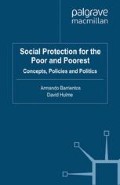Abstract
Since the mid-1990s a new trend in social policies has appeared in Latin America: the provision of grants to targeted poor households on condition that they engage in human capital investments, such as sending children to school and making periodic visits to health centres. These programmes, known as conditional cash transfers (CCTs), address demand-side constraints for structural poverty reduction, through an incentive scheme that combines the short-term objectives of safety nets with long-term goals of breaking intergenerational poverty traps.
Access this chapter
Tax calculation will be finalised at checkout
Purchases are for personal use only
Preview
Unable to display preview. Download preview PDF.
References
Adato, M. (2000) The Impact of PROGRESA on Community Social Relationships. Washington, DC: International Food Policy Research Institute.
Adato, M., B. de la Brière, D. Mindek and A. Quisumbing (2000) ‘El Impacto de Progresa en la Condición de la Mujer y en las Relaciones al Interior del Hogar’, in SEDESOL, Más Oportunidades para las Famílias Pobres–Impacto en el Trabajo y las Relaciones Familiares. Mexico City, Mexico: SEDESOL, pp. 65–211.
Ayala Consulting (2003) Workshop on Conditional Cash Transfer Programs (CCTs): Operational Experiences. Final Report (Quito, Ecuador, 29 April–1 May, 2003 ).
Bourguignon, F., F. Ferreira and P. Leite (2002) Ex-ante Evaluation of Conditional Cash Transfer Programs: The Case of Bolsa Escola. Washington, DC: The World Bank.
CEPAL–UN Economic Comission for Latin America and the Caribbean (2002) Panorama Social de América Latina 2001–2002. Santiago, Chile: CEPAL.
Coady, D. (2003) Alleviating Structural Poverty in Developing Countries: The Approach of Progresa in Mexico. Background paper for the World Development Report 2004. Washington, DC: The World Bank.
Coady, D., M. Grosh and J. Hoddinott (2002) ‘The Targeting of Transfers in Developing Countries: Review of Experiences and Lessons’. Social Safety Net Primer Series. Washington, DC: The World Bank.
Cornia, G. A. (2002) ‘Social Funds in Stabilization and Adjustment Programs: A Critique’, Working Paper ChilD 13/2002. Turin, Italy: Center for Household, Income, Labour and Demographic Economics.
Deacon, B., M. Hulse and P. Stubbs (1997) Global Social Policy: International Organizations and the Future of Welfare. London, UK: Sage Publications.
Graham, C. (2002) ‘Public Attitudes Matter: A Conceptual Frame for Accounting for Political Economy in Safety Nets and Social Assistance Policies’, Social Protection Discussion Paper Series No. 0233. Washington, DC: The World Bank.
Grindle, M. S. and J. W. Thomas (1991) Public Choices and Policy Change: The Political Economy of Reform in Developing Countries. Baltimore, MA: Johns Hopkins University Press.
Grosh, M. E. (1995) ‘Five Criteria for Choosing among Poverty Programs’, in N. Lustig (ed.), Coping with Austerity: Poverty and Inequality in Latin America. Washington, DC: The Brookings Institution, pp. 146–186.
MEC–Ministério da Educação (2002) Identificação e Inclusão de Famílias no Bolsa Escola Federal. Brasilia, Brazil: MEC.
Menocal, A. R. (2001) ‘Do Old Habits Die Hard? A Statistical Exploration of the Politicisation of Progresa, Mexico’s Latest Federal Poverty-Alleviation Programme, under the Zedillo Administration’, Journal of Latin American Studies, 3 (33), 513–538.
Morley, S. A. and D. Coady (2003) From Social Assistance to Social Development: Targeted Education Subsidies in Developing Countries. Washington, DC: International Food Policy Research Institute.
Patton, C. V. and D. S. Sawicki (1996) Basic Methods of Policy Analysis and Planning, pp. 207–219. Englewood Cliffs, NJ: Prentice Hall.
Rawlings, L. B. and G. M. Rubio (2004) Evaluating the Impact of Conditional Cash Transfer Programs: Lessons from Latin America. Washington, DC: The World Bank.
Scott, J. (1999) Análisis del Programa de Educación, Salud y Alimentación (PROGRESA): México. Mexico City, Mexico: CIDE.
Sedlacek, G., N. Ilahi and E. Gustafsson-Wright (2000) Targeted Conditional Transfer Programs in Latin America: An Early Survey. Washington, DC: The World Bank.
Skoufias, E., B. Davis and S. de la Vega (2001) ‘Targeting the Poor: An Evaluation of the Selection of Households into PROGRESA’, World Development, 29 (10), 1769–1784.
Soares, F., S. Soares, M. Medeiros and R. Guerreiro (2006) ‘Cash Transfers Programmes in Brazil: Impacts on Inequality and Poverty’, Working Paper # 21. Brasília, Brazil: International Poverty Centre.
Suplicy, E. (2006) Renda Básica de Cidadania: a resposta dada pelo vento. Porto Alegre, Brazil: LaaaaaPM.
Székely, M. (2001) ‘Where to from here? Generating capabilities and creating opportunities for the poor’, Research Network Working Papers, R-431. Washington, DC: IDB.
Tendler, J. (2000) ‘Why are social funds so popular?’, in Y. Shahid, W. Wu, and S. Evenett (eds), Local Dynamics in the Era of Globalization. Oxford: Oxford University Press for the World Bank, pp. 114–129.
Yaschine, I. (1999) ‘The changing anti-poverty agenda: What can the Mexican case tell us?’, IDS Bulletin, 2 (30), 47–60.
Zepeda, E. (2006) ‘Do CCTs reduce poverty?’ One Pager # 21. Brasília, Brazil: International Poverty Centre.
Editor information
Editors and Affiliations
Copyright information
© 2008 Palgrave Macmillan, a division of Macmillan Publishers Limited
About this chapter
Cite this chapter
de Britto, T.F. (2008). The Emergence and Popularity of Conditional Cash Transfers in Latin America. In: Barrientos, A., Hulme, D. (eds) Social Protection for the Poor and Poorest. Palgrave Studies in Development. Palgrave Macmillan, London. https://doi.org/10.1057/978-0-230-58309-2_9
Download citation
DOI: https://doi.org/10.1057/978-0-230-58309-2_9
Publisher Name: Palgrave Macmillan, London
Print ISBN: 978-0-230-27358-0
Online ISBN: 978-0-230-58309-2
eBook Packages: Palgrave Social & Cultural Studies CollectionSocial Sciences (R0)

